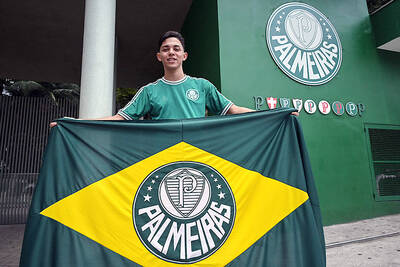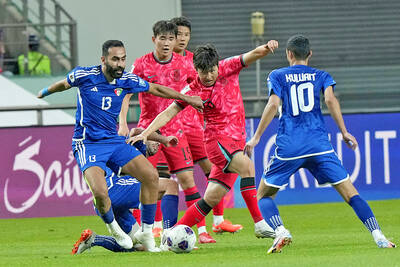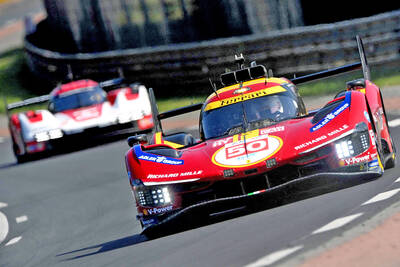When it comes to questions whether Portugal's security forces will be ready for the 2004 European Championship, the answer depends on who you speak to -- the authorities or cops on the beat.
The government, bracing for possible violent clashes between the expected 1.2 million fans at the biggest sports event ever held in Portugal, insists the preparations are on track.
Representatives of the security forces aren't so sure.
Jose Luis Arnaut, the government minister overseeing the three-week event, won't go into detail about security arrangements but says he's not worried.
"We're sure everything will go smoothly. All necessary precautions will be taken," Arnaut said at a recent meeting with foreign reporters.
But in telephone interviews, police representatives said they were understaffed and under-equipped.
They also have long-standing contract grievances with the government which may translate into labor disruptions around the championships.
Soccer-related violence is rare in Portugal.
Europe's entrenched problem of soccer hooliganism stained the last championships in 2000, jointly held in Belgium and the Netherlands, where hundreds were arrested after clashing in city streets and trashing bars and shops. Violence marred the World Cup in Spain in 1982, in Italy in 1990 and in France in 1998.
The trouble may well seep into Portugal.
Yet less than five months before Portugal and Greece kick off in the opening game, police are voicing concern about what they claim is a shortage of manpower and delays in deploying promised modern equipment, worth US$20 million and including water cannon and new riot gear, to counter hooliganism.
"We haven't enough men for patrols now, never mind at Euro 2004," said Antonio Ramos, president of the Police Union and a beat officer. "We haven't been properly equipped for years."
Ramos lists a worrying number of broken-down patrol cars, outdated computers and defective radios among the shortcomings.
"We often have to use our own cellphones to call the station when we're out on duty," he said.
New riot gear hasn't arrived yet, though the government says it will be in place by March.
Crucially, an integrated communications system which for the first time will allow Portugal's emergency services -- police, the fire service and the ambulance service -- to talk to each other directly over the same frequency will not be ready in time for Euro 2004.
The government recently pledged to hire another 1,200 officers to beef up the police force.
But that won't be much help -- the police training course lasts one year.
"We're pretty gloomy," Ramos said.
Portugal is patrolled by two police forces -- an urban force known by its acronym PSP, and, outside major towns and cities, the Guarda Nacional Republicana, or GNR, a semi-military force like Italy's carabinieri.
This force will be in charge of shadowing foreign fans traveling to games, providing security at the 16 participating teams' training camps, and will be on duty at three rural stadiums where some games are to be held.
Jose Manageiro, a policeman for the past 20 years who also heads the GNR Association, a representative body, says the police wanted to begin training and using new riot equipment from the start of the Portuguese league soccer season last September.
But halfway through the season, that training is still very patchy, he said.
An economic recession last year and a cash shortage due to previous spend-happy administrations has forced the government to enact severe spending cuts. All public services are feeling the pinch.
The government is now scrambling to make up lost time.
The Portuguese have a sometimes infuriating but often endearing habit of leaving things till the last minute and then cheerfully muddling their way through. Euro 2004 could well be another manifestation of that national trait.

Brazil has four teams, more than any other country, in the expanded Club World Cup that kicked off yesterday in the US, but for SE Palmeiras, the competition holds a special meaning: winning it would provide some redemption. Under coach Abel Ferreira since 2020, Palmeiras lifted two Copa Libertadores titles, plus Brazilian league, cup and state championships. Even before Ferreira, it boasted another South American crown and 11 league titles. The only major trophy missing is a world champions’ title. Other Brazilian clubs like Fluminense FC and Botafogo FR, also in the tournament, have never won it either, but the problem for Palmeiras

Paris Saint-Germain’s Lee Kang-in has pleaded with South Korea fans to get behind the team at the 2026 FIFA World Cup after more boos were aimed at coach Hong Myung-bo despite leading them to qualification. South Korea reached next year’s finals in North America without losing a game, but that does not tell the whole story. The country’s soccer association has been in the firing line, having scrambled about to find a successor after sacking the unpopular Jurgen Klinsmann in February last year. They eventually settled on Hong, the decorated former skipper who had an unsuccessful stint as coach in 2013-2014, during which

Lionel Messi drew vast crowds and showed flashes of his brilliance when his Inter Miami side were held to a goalless draw by African giants Al-Ahly as the revamped FIFA Club World Cup got off to a festive start on Saturday. Fans showed up en masse for the Group A clash at the Hard Rock Stadium, home to the NFL’s Miami Dolphins, but Messi could not fully deliver, his best chance coming through a last-second attempt that was deflected onto the crossbar. Inter Miami next face FC Porto on Thursday in Atlanta, while Al-Ahly, who benefited from raucous, massive support, are to

Ferrari’s F1 fortunes might be flagging, but the Italian team start this weekend’s 24 Hours of Le Mans as favorites, targeting a third consecutive triumph in motorsport’s fabled endurance classic. Roger Federer is acting as celebrity starter with the tennis icon getting the 93rd edition of the jewel in four-wheeled endurance racing’s crown under way tomorrow. Twenty-four hours later, through daylight, darkness and dawn, the 21 elite hypercars are to battle it out over 300 laps (more than 4,000km) in front of a sold-out 320,000 crowd burning the midnight oil with copious quantities of coffee and beer. Ferrari made a triumphant return after